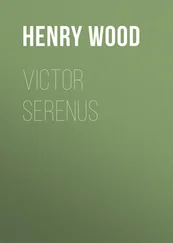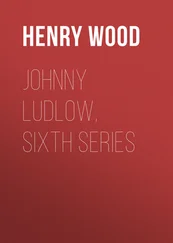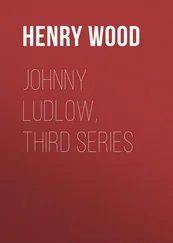Henry Wood - Johnny Ludlow, Fourth Series
Здесь есть возможность читать онлайн «Henry Wood - Johnny Ludlow, Fourth Series» — ознакомительный отрывок электронной книги совершенно бесплатно, а после прочтения отрывка купить полную версию. В некоторых случаях можно слушать аудио, скачать через торрент в формате fb2 и присутствует краткое содержание. Жанр: foreign_prose, literature_19, foreign_antique, на английском языке. Описание произведения, (предисловие) а так же отзывы посетителей доступны на портале библиотеки ЛибКат.
- Название:Johnny Ludlow, Fourth Series
- Автор:
- Жанр:
- Год:неизвестен
- ISBN:нет данных
- Рейтинг книги:5 / 5. Голосов: 1
-
Избранное:Добавить в избранное
- Отзывы:
-
Ваша оценка:
- 100
- 1
- 2
- 3
- 4
- 5
Johnny Ludlow, Fourth Series: краткое содержание, описание и аннотация
Предлагаем к чтению аннотацию, описание, краткое содержание или предисловие (зависит от того, что написал сам автор книги «Johnny Ludlow, Fourth Series»). Если вы не нашли необходимую информацию о книге — напишите в комментариях, мы постараемся отыскать её.
Johnny Ludlow, Fourth Series — читать онлайн ознакомительный отрывок
Ниже представлен текст книги, разбитый по страницам. Система сохранения места последней прочитанной страницы, позволяет с удобством читать онлайн бесплатно книгу «Johnny Ludlow, Fourth Series», без необходимости каждый раз заново искать на чём Вы остановились. Поставьте закладку, и сможете в любой момент перейти на страницу, на которой закончили чтение.
Интервал:
Закладка:
“And if ever you two boys serve me such a trick again—bringing me over with a cock-and-bull story that people have come back from sea who haven’t—I’ll punish you,” stuttered the Squire, too angry to speak clearly.
We went away in humility; heads down, metaphorically speaking, tails between legs. The Squire kept up the ball, firing away sarcastic reproaches hotly.
Tod never answered. The truth was, he felt angry himself. Not with the Squire, but with the affair altogether. Tod hated mystification, and the matter was mystifying him utterly. With all his heart, with all the sight of his eyes, he had believed it to be William Brook: and he could not drive the conviction away, that it was Brook, and that St. George was giving him house room.
“I don’t like complications,” spoke he resentfully.
“Complications!” retorted the Squire. “What complications are there in this? None. You two lads must have been thinking of William Brook, perhaps speaking of him, and so you thought you saw him. That’s all about it, Joe.”
The complications were not at an end. A curious addition to them was at hand. The Squire came to a halt at the turning to the Ravine, undecided whether to betake himself home at once, or to make a call first at Timberdale Court, to see Robert Ashton.
“I think we’ll go there, lads,” said he: “there’s plenty of time. I want to ask him how that squabble about the hunting arrangements has been settled.”
So we continued our way along the road, presently crossing it to take the one in which the Court was situated: a large handsome house, lying back on the right hand. Before gaining it, however, we had to pass the pretty villa rented by Mr. St. George, its stable and coach-house and dog-kennel beside it. The railway was on ahead; a train was shrieking itself at that moment into the station.
St. George’s groom and man-of-all-work, Japhet, was sweeping up the leaves on the little lawn. Tod, who was in advance of us, put his arms on the gate. “Are you going to make a bonfire with them?” asked he.
“There’s enough for’t, sir,” answered Japhet. “I never see such a wind as yesterday’s,” he ran on, dropping his besom to face Tod, for the man was a lazy fellow, always ready for a gossip. “I’m sure I thought it ’ud ha’ blowed the trees down as well as the leaves.”
“It was pretty strong,” assented Tod, as I halted beside him, and the Squire walked on towards the Court. “We were out in it—coming home from Pigeon Green. There was one gust that I thought would have blown the horses right over.”
“The master, he were out in it, too, a coming home from Worcester,” cried Japhet, taking off his old hat to push his red hair back. “When he got in here, he said as he’d had enough on’t for one journey. I should think the poor horse had too; his coat were all wet.”
Tod lifted up his head, speaking impulsively. “Was your master alone, Japhet, when he got home? Had he any one with him?”
“Yes, he were all alone, sir,” replied the man. “Miss Delorane were with him when he drove off in the morning, but she stayed at Worcester.”
Had Tod taken a moment for thought he might not have asked the question. He had nothing of the sneak in him, and would have scorned to pump a servant about his master’s movements. The answer tended to destroy his theory of Brook’s being concealed here, and to uphold the account given by Mr. St. George.
Quitting the railings, we ran to catch up the Squire. And at that moment two or three railway passengers loomed into view, coming from the train. One of them was Ellin Delorane.
She came along briskly, with a buoyant step and a smiling face. The Squire dropped us a word of caution.
“Now don’t go telling her of your stupid fancy about Brook, you two: it would only cause her disappointment.” And with the last word we met her.
“Ah ha, Miss Ellin!” he exclaimed, taking her hands. “And so the truant’s back again!”
“Yes, he is back again,” she softly whispered, with a blush that was deep in colour.
The Squire did not quite catch the words. She and he were at cross-purposes. “We have but now left your house, my dear,” he continued. “Your aunt does not expect you back to-day; she thought you would stay at Worcester till Saturday.”
Ellin smiled shyly. “Have you seen him?” she asked in the same soft whisper.
“Seen whom, my dear?”
“Mr. Brook.”
“Mr. Brook! Do you mean William Brook? He is not back, is he?”
“Yes, he is back,” she answered. “I thought you might have seen him: you spoke of the return of the truant.”
“Why, child, I meant you,” explained the Squire. “Nobody else. Who says William Brook is back?”
“Oh, I say it,” returned Ellin, her cheeks all rosy dimples. “He reached Worcester yesterday.”
“And where is he now?” cried the Squire, feeling a little at sea.
“He is here, at Timberdale,” answered Ellin. “Mr. St. George drove him home last night.”
“There!” cried Tod with startling emphasis. “There, father, please not to disparage my sight any more.”
Well, what do you think of this for another complication? It took me aback. The Squire rubbed his face, and stared.
“My dear, just let us understand how the land lies,” said he, putting his hand on Ellin’s shoulder. “Do you say that William Brook reached Worcester yesterday on his return, and that St. George drove him home here at night?”
“Yes,” replied Ellin. “Why should you doubt it? It is true.”
“Well, we thought St. George did drive him home,” was the Squire’s answer, staring into her face; “we passed his gig in Dip Lane and thought that it was Brook that he had with him. But St. George denies this. He says it was not Brook; that he has not seen Brook, does not know he has come home; he says the man he had with him was a stranger, to whom he was giving a lift.”
Ellin looked grave for a moment; then the smiles broke out again.
“St. George must have been joking,” she cried; “he cannot mean it. He happened to be at Worcester Station yesterday when Mr. Brook arrived by the Birmingham train: we suppose he then offered to drive him home. Any way, he did do it.”
“But St. George denied that he did, Ellin,” I said.
“He will not deny it to me, Johnny. Gregory West, returning from a visit to some client at Spetchley, met them in the gig together.”
The Squire listened as a man dazed. “I can’t make head or tail of it,” cried he. “What does St. George mean by denying that he brought Brook? And where is Brook?”
“Has no one seen him?” questioned Ellin.
“Not a soul, apparently. Ellin, my girl,” added the Squire, “we will walk back with you to your father’s, and get this cleared up. Come along, boys.”
So back we went to turn the tables upon St. George, Tod in a rapture of gratification. You might have thought he was treading upon eggs.
We had it out this time in Mr. Delorane’s private office; the Squire walked straight into it. Not but that “having it out” must be regarded as a figure of speech, for elucidation seemed farther off than before, and the complications greater.
Mr. Delorane and his head-clerk were both bending over the same parchment when we entered. Ellin kissed her father, and turned to St. George.
“Why have you been saying that you did not drive home William Brook?” she asked as they shook hands.
“A moment, my dear; let me speak,” interrupted the Squire, who never believed any one’s explanation could be so lucid as his own. “Delorane, I left you just now with an apology for having brought to you a cock-and-bull story through the misleading fancies of these boys; but we have come back again to tell you the story’s true. Your daughter here says that it was William Brook that St. George had in his gig. And perhaps Mr. St. George”—giving that gentleman a sharp nod—“will explain what he meant by denying it?”
Читать дальшеИнтервал:
Закладка:
Похожие книги на «Johnny Ludlow, Fourth Series»
Представляем Вашему вниманию похожие книги на «Johnny Ludlow, Fourth Series» списком для выбора. Мы отобрали схожую по названию и смыслу литературу в надежде предоставить читателям больше вариантов отыскать новые, интересные, ещё непрочитанные произведения.
Обсуждение, отзывы о книге «Johnny Ludlow, Fourth Series» и просто собственные мнения читателей. Оставьте ваши комментарии, напишите, что Вы думаете о произведении, его смысле или главных героях. Укажите что конкретно понравилось, а что нет, и почему Вы так считаете.












